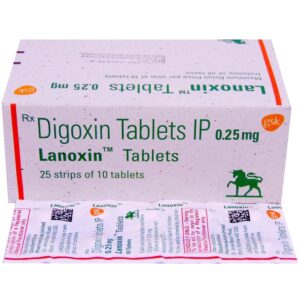DIGOXIN
DIGOXIN: Digoxin is a medication primarily used to treat heart conditions such as atrial fibrillation, atrial flutter, and congestive heart failure. It belongs to the class of drugs known as cardiac glycosides.
The mechanism of action of digoxin involves inhibiting the enzyme Na+/K+-ATPase, which leads to an increase in intracellular sodium levels. This, in turn, disrupts the Na+/Ca2+ exchange mechanism, resulting in an increased intracellular calcium concentration. The increased calcium levels enhance myocardial contractility, leading to a stronger and more efficient heartbeat. Digoxin also has a vagomimetic effect, which helps slow down the heart rate and improve symptoms in certain conditions.
The dose of digoxin varies depending on the condition being treated. For congestive heart failure, the initial dose is usually 0.125-0.25 mg once daily, while for atrial fibrillation and atrial flutter, the initial dose is typically 0.125-0.5 mg once daily. The exact dose should be determined by a healthcare professional based on individual patient factors and response.
Side effects of digoxin can include nausea, vomiting, loss of appetite, headache, dizziness, vision changes (such as seeing a yellow-green halo around objects), and mental/mood changes (such as confusion or depression). These side effects are usually mild and may diminish with dose adjustment. However, serious side effects like irregular heartbeat, severe dizziness, fainting, and allergic reactions are rare but require immediate medical attention.
It is important to note that digoxin is a medication that has a narrow therapeutic index, meaning that the difference between a therapeutic dose and a toxic dose can be small. Therefore, regular monitoring of blood digoxin levels is typically recommended to ensure the drug is within the appropriate therapeutic range and to minimize the risk of toxicity.

